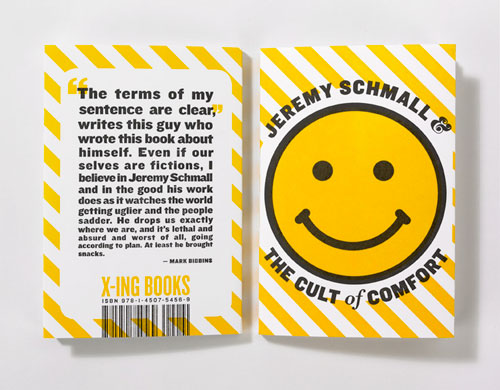
Baudelaire as "Les Fleurs du Mal", silkscreen, 25 x 20"
Brand new for preorder pending a later summer release is Jack Boettcher’s Theater-State, a book I’ve been hearing about and anticipating for quite some time. The second book from the NYC/Atlanta based Blue Square Press, this is one you should support early and pregrab a copy of: the quality of their first release, and the subsequent word on Jack’s book guarantees it’s going to shred. Check it:

“Theater State reveals the panopticon not as an instrument of surveillance but as a mesmerizing holograph from which we prisoners of “reality” (and of high school) cannot tear our eyes. In this inside-out world, violence is an encircling Megahighway and the center mutable, vulnerable, and virtual, always flowing somewhere else. As young Janus negotiates the heights and sinkholes of adolescence, including an affair with a regional pop-avatar, servitude to a morphing, megalomaniacal principal, and a class project managing a convulsive neocolony, Jack Boettcher’s reticulated sentences themselves contract and unfurl with sometimes enticing, sometimes ensnaring beauty. As the civics teacher Ms. Denton TX threatens: “Learning is an adventure.””
–Joyelle McSweeney, author of Nylund, the Sarcographer, The Red Bird, and The Commandrine and Other Poems
“Even though the principal in Boettcher’s Theater-State has a white tiger slumbering in his office, the school that Janus and Katydid and Cassie attend, with Ms. Denton, TX as their teacher, is all too familiar – terrifyingly familiar. The mind-bending cross over between the world of statecraft and a private science academy becomes all too real for Janus…when it is revealed that it is drivers that shape the roads and not the other way around…and when the general paranoid lyricism of Boettcher’s odd and compelling novel, like the Mayan ceremonial white roads, leads you not necessarily to a destination but on a journey. It’s an amazing journey. I don’t think you have any choice but to take it.”
–Matthew Rohrer, author of Destroyer and Preserver, Rise up, and A Green Light
An excerpt from the book and preorder info are available here.
Periodically Speaking hosts SUPERMACHINE and 6X6 (UGLY DUCKLING PRESSE) magazines—

Ben Fama and Matvei Yankelevich in conversation with
(and readings by):
Macgregor Card
Corina Copp
Dorothea Lasky
Founders of influential literary mags 6X6, SUPERMACHINE, and the former GERM, with writers they’ve published over the years, discuss the past, present and future of literary publishing, after brief readings.
Tuesday, April 12 · 6:00pm – 7:30pm
DeWitt Wallace Periodical Room, The New York Public Library
Stephen A. Schwarzman Building @ 5th Ave & 42nd Street
New York, NY
(FACEBOOK)

Jeremy Schmall is the bioluminescent pancake maker behind the radical operation that calls itself The Agriculture Reader. If you haven’t read an issue of AGR, you’re going to want to do that. Jeremy Schmall & the Cult of Comfort, published by X-ing Books, is a 99-page collection with 48 poems. The book is supremely beautiful, like all of the objects from X-ing. And it’s tiny, which is awesome, because you’ll want to carry this book around with you, and throw it at people, and cause major social disruptions with it by your side, and hang out in the park afterwards, maybe with a couple beers, making funny faces in the dark.
Two cool readings coming up in NYC:
1) Tonight April 9th @ 7PM @ Unnameable Books: Big Other Presents John Haskell, Jamie Iredell, and John Madera
2) Monday April 11th @ 8PM @ The Poetry Project: Rachel B Glaser & Amy Lawless
Feel free to give a shout out for elsewhere readings in the comments.

This blog written by Ariel S. Winter catalogs children’s literature by adult authors of the 21st century which are apparently currently out of print. My faves: The Cat and the Devil by James Joyce, which is actually back in print now, all of these by Langston Hughes, and Andy Warhol’s Card Games Are Fun.
The name Ariel S. Winter reminds me of Jonathan Winters. Where do people get these names anyway? Jack Pendarvis blogged about him today. Jack Pendarvis is an adult author who really should write some children’s fiction. I think people who made up fairy tales like those of the Brothers Grimm probably had a mind very much like that of Mr. Pendarvis.
On my breaks from subbing a class of fourth graders at an international school, I read a lot of Howard Zinn’s A Young People’s History of the United States. In his introduction Zinn defends the adaptation of his book from critics who I’m sure did denounce the book for presenting children with an alternate view of the American history they are still in the process of learning. I don’t remember exactly what he said exactly, but it was pretty much along the lines of: Most people treat children like children even though they understand everything that’s going on just as well as anyone. My feeling on this is that most people who treat children like children and think they can’t handle the Truth! haven’t been around children very much. READ MORE >
[In this series I will think aloud about the multifarious process of publishing a first book.]
The first time I ever cursed was in the fourth grade. I’d just transferred out of Catholic school to public school. I was standing at the door to Mrs. Rogers’ portable classroom, friendless and waiting to be dismissed, when I mouthed the word “shit.” Then I whispered it. Then I said it. Just like that. Shit! I couldn’t stop smiling.
I didn’t feel the same exuberant freedom again until I was 18 and shaved my head. I remember looking into the rearview mirror of my ’86 Le Sabre after I’d buzzed my hair off; I couldn’t stop grinning.
I’m 33, and it just happened for the third time. For weeks I’d been awaiting the publication of my first book, but I’d become petrified of its first poem—that it IS the first poem in the book with its one goddamn, one fucker, and one motherfucker in 20 lines, and that certain people (such as my Italian Catholic grandmother) would read that first poem and get their feathers ruffled, feel disappointed that I’m actually such a no-good heathen. What were my publishers thinking?
This poem will always be the first poem of the book. It’ll always set a tone, which is why it’s the first poem. It’ll be there to remind me that I like to run my mouth (but also to remind me that I enjoy mis-hearings, misunderstandings, and even occasional misanthropy). That’s a lot of pressure for one little guy in a sea of bigger fish (it’s close to the shortest poem in the book).
Then I got my author copies in the mail, and I realized that the language I very deliberately chose for this poem—and every poem—simply embodies my fourth-grade epiphany or my freshman-year hair buzz, those times I used my body as the subject of my own story, pleasuring in the language of the forbidden, simultaneously defining and deferring definitions (the eternal tension of différance), and felt the freedom therein.
Basically, I’m saying that if I ever go to hell, I hope it’s because of my motherfucking mouth. That’s not all I’m saying, but it’s a start.
I have an intense attachment to the books I loved as a child and teenager. I think we all do. As you might imagine, when I learned there would be a new addition go the Sweet Valley High canon, I clutched my pearls and lost my shit. I started reading Sweet Valley Confidential when it downloaded to my Kindle at 2:30 in the morning on the day it was released. Ten years have passed since we last encountered our heroines, Elizabeth and Jessica Wakefield. Everything has changed and yet, truly, nothing has changed in Sweet Valley, California. Almost every woman I know who is my age or thereabouts is reading this book right now and it has little to do with the book itself (terribly, terribly written) or the plot (horribly contrived and outlandish). It’s about remembering how much we loved the original series, and following the lives of The Twins, who were perfect, All-American girls we either loved or loved to hate. I have every reason in the world to hate everything about these books but I don’t. I love them, unabashedly and I will admit that I love this reboot, too. The drama! The scandal! Knowing where they are now!
In the original series, nearly every book began with a breathless description of The Twins and their blonde perfection. It did my heart good to see that SVC has not strayed too far from the path:
Like the twins of that poem, Elizabeth and Jessica Wakefield appeared interchangeable, if you considered only their faces.
And what faces they were.
Gorgeous. Absolutely amazing. The kind you couldn’t stop looking at. Their eyes were shades of aqua that danced in the light like shards of precious stones, oval and fringed with thick, light brown lashes long enough to cast a shadow on their cheeks. Their silky blond hair, the cascading kind, fell just below their shoulders. And to complete the perfection, their rosy lips looked as if they were penciled on. There wasn’t a thing wrong with their figures, either. It was as if billions of possibilities all fell together perfectly.
Twice.
Who else is reading this? Fess up!
Is there a correlation between someone’s personality and their literary output? Do you ever find yourself anticipating/hypothesizing/predicting/assuming what someone’s work will be like based on their intelligence/sense-of-humor/self-awareness/”‘moral’ character”/etc.? If someone is annoying in real life do you assume that their work will come at you in a 14 pt., bold, helvetica-like font and be annoying as well? And then, after you assume that, how often do you find that to be the case? If you are well liked, will your work be well liked? For those of us TOTALLY CONSUMED BY POETRY AND LITERATURE, is not our work the truest representation of ourselves? I want stories. Please share.